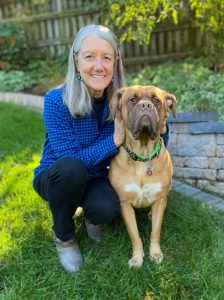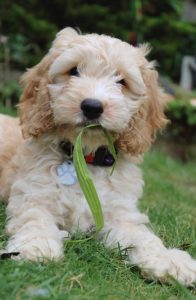
TERRY LACKMEYER
Customer Service Representative

First and foremost, get a crate and use it. Many people don’t like the idea of a crate because they think they are putting their dog in a cage. Nothing could be further from the truth. Dogs are similar to wolves and foxes, who, in the wild, make their homes in dens. Your puppy very quickly will learn that this is their den, their safe place. This is where they can go to relax, sleep, and get away from the hubbub of life if they feel overwhelmed. Not only that, but also the crate will give you peace of mind knowing that when you can’t keep an eye on your puppy, they are safely contained in their crate and out of harm’s way. A cautionary note – never leave a collar or harness of any kind on your puppy when putting them in the crate. It is much too easy for a collar or harness to snag, and you don’t want to find your sweet little pup has choked.
The best way to puppy proof your home is to think like a puppy or a toddler. Puppies are very much like toddlers in that they investigate everything and explore things by putting them in their mouths. Get down on your hands and knees and see what your puppy sees. If it moves, sparkles, smells good, doesn’t smell good, looks enticing, or is just there it’s fair game. So, if you don’t want it chewed, place it out of the way!
Wires and Electrical Appliances
Wires are everywhere in our homes and are potentially lethal. You can get covers to secure wires, especially around the holidays. Protect outlets with covers. The moisture of a puppy’s tongue and electricity will not mix.
Many people these days own paper shredders. While it is inconvenient, it is best to have the shredder unplugged. There have been documented cases where dogs have gotten their tongues caught in the shredder – it’s much better to be safe and inconvenienced than horrifically sorry. Remote controls also are a great lure for puppies. The sweat from our hands is all over the remotes and is like salted potato chips to dogs, so keep them out of reach.
Waste Bins
Trash cans and diaper pals are like magnets for puppies. Store them in a closet or cupboard or have securely closing lids or lids that lock. Not only will your puppy make an incredible mess if they get into these things, but also trash cans can contain many food scraps that are hazardous to puppies. Things such as raisins, grapes, chocolate, and onions can be toxic to your pet. Bones can easily get caught in your puppy’s throat. Trash bins may also have containers that a puppy could easily get their head stuck into or plastic bags that can cause suffocation or be swallowed and cause intestinal problems.
Home Décor
Be sure lamps, decorations, and coffee and end table accents are secure and out of the way. Any baskets or crates containing craft supplies or small items should be stored on high shelves or safely tucked in closets.
Window treatments, such as low hanging curtains or drapes, can make for a fun game of tug-of-war for puppies that can result in pulling the entire curtain rod from the wall. Likewise, puppies can easily get entangled or choke in the cords of drapes, blinds, or shades so tuck these items safely away from your puppy’s reach.
Medications and Bathrooms
Remember, puppies can chew and ingest anything, so while those child-proof caps may keep children from getting into medications they won’t stop your puppy. Secure all medications, including over-the-counter items and supplements in cabinets and out of reach of your puppy.
Hygienic items, usually found in bathrooms, provide great temptation to pups. Use a lidded trash can and store it in a closet or cabinet. Keep the toilet lids down as well. Puppies should not be drinking from the toilet for any reason. Toilet bowl cleaners or fresheners attached to the bowl are particularly hazardous.
Cleaning Supplies
All cleaning supplies, including the all-natural varieties, should be stored safely out of reach, or secured inside cabinets. If necessary, add locks to those cabinets so the pup can’t get them open and help themselves to the contents. Even if the product label touts it is “all natural and safe for pets,” that does not necessarily apply if your pet should ingest any of these products.
Indoor Plants
Many plants are hazardous to pets. While some only may cause gastric upset, others are potentially lethal. Review and research your plants so that you know which ones are safe and which are potentially harmful. Remove all harmful plants. Position all plants out of reach of your puppy. You do not want to enter the room and find your puppy has knocked the pot over and tracked the dirt all over the rug and floor and well as covered themself.
Gardening and Garage Supplies
Insect sprays, rat poisons, and herbicides are potentially lethal if ingested. Steer clear of using any of these products unless absolutely necessary and keep your puppy away from them.
Anti-freeze is lethal to pets, and it only takes a few drops to cause serious kidney issues or death. Pets are drawn to the sweet taste of anti-freeze so immediately soak up any spills with clay kitty litter or hose down the area thoroughly. Better yet never let your pet in the area when you are working with anti-freeze and check thoroughly that none has dripped onto the floor. When walking your puppy, never let them lick up anything they find puddled in the street or roadway, as it could be anti-freeze or some other potentially dangerous product.
If you suspect your puppy has ingested a dangerous product, call Poison Control immediately at 800-222-1222 and contact your veterinarian.
Make sure all heavy garage and garden tools are safely secured and out of the way. You don’t want your puppy injured by one of these falling tools. Store all small items, like screws and nails, well out of reach of your puppy.
Puppies can scoot out garage doors or snooze under parked cars. Be sure your puppy is safely in the house (hopefully, in their crate) before opening the doors or starting your car and pulling out.
Backyard
Having a fenced yard provides a nice play area for your puppy, but don’t let that fencing lull you into a false sense of security. Before releasing your puppy into the yard, check that there are no small holes or openings where your puppy can escape. Close gates completely and latch them securely. You may want to add a chain around the gate as a safeguard in the event the latch fails.
Keep grass and bushes neatly trimmed as these are great hiding places for fleas and ticks. Just like in your home, check there are no toxic plants or bushes in the area.
Pools are huge hazards for puppies. If you have a swimming pool, keep your puppy from having access to it. Fencing around the pool adds even more protection, not only for your puppy but also for any young children in the household or neighborhood.
Set aside a specific area of the yard where you want your puppy to potty. Take them there each time they need to go out. They will quickly learn that this is the potty area and save you the work of cleaning up the entire yard. Clean up after them, too. You don’t want your puppy to get into the nasty habit of ingesting their feces.
Supervise your puppy when they are outside. Don’t let them remain out too long in the extreme winter cold or heat of summer. Puppies can be very susceptible to frostbite and heatstroke. They should have ample water when outside and shade to escape the sun.
Patrolling your puppy’s environment to make sure it is safe, secure, and healthy may seem overwhelming initially, but watching that puppy learn and grow into a happy healthy dog is well worth the effort. Knowing you did everything possible to keep them safe and give them a great start goes a long way to creating a happy life for both you and your puppy and many long years of wonderful companionship.
